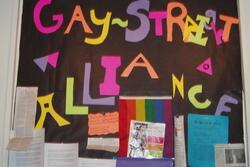American Education: Classrooms, Competition, and Corruption
Dear Adults,
I hope this letter reaches you all in good health. Because you’re adults, I’ll assume that perhaps you don’t regularly think about your elementary, middle, and high school experiences. So, I’ll take it from the beginning.
I’ve always been a high-achieving student. Since I began elementary school, I found my way into every enrichment program and was always in the highest levels. I grew up “gifted.” My giftedness gave me so many gifts, like special stickers on my worksheets and longer books than my peers. My first-grade class performed a show about the alphabet and I, along with a few others, got to read a paragraph while everyone else just wore their designated consonant or vowel. While all the other third graders did regular math, I got to go to a special classroom and learn about the stock market. It was also in third grade that we began taking the NJASK (New Jersey Assessment of Skills and Knowledge) test and my scores were always “advanced proficient.” But, to be honest, I didn’t expect anything else.
Because my naive brain grew and developed in this environment, it seems natural and inevitable that I would begin to equate smartness with worth. And that I did.
I left my freshman year with straight A’s, which I credit to the perfect balance of easier teachers and my academic inclination. I began my sophomore year with two AP classes because, what else would a gifted and talented student do?
But something was off. For starters, I was always stressed, even when my workload was light. My test scores were never good enough, no matter how hard I worked. School was no longer easy, but the actual work was not the problem. It was the environment.
When you get to high school, you are faced with the reality that it is a competition. The institution of education, by its very nature, pits students against one another. All of a sudden, you’re hit with a stream of letter grades, GPAs, SAT scores, and countless other indicators meant to measure how smart you really are. And today’s students have grown up knowing the unspoken truth that intelligence is equal to worth. All of sudden, you are nothing more than your 76 in algebra. Your 4.5 is not good enough because someone else has a 4.6. You missed a homework assignment? Well, now you’re only worth as much as that 0 in PowerSchool.
Day after day, students are reminded of the importance of good grades. We’re told our grades reflect who we are. Our grades are how we will get into college, and therefore how we will get a good job, and therefore how we will live a successful and fulfilling life. Colleges grow more and more competitive by the year. It’s not just about if you have the right grades; it’s about if you have the right grades, competitive SAT scores, fulfilling extracurriculars, and stellar letters of recommendation; but, most importantly, it’s about if you are lucky enough to get chosen over the thousands of other kids who have the same exact qualifications.
But the most fatal flaw of our country’s education system is its exclusivity. America has standardized education; the entire institution is meant for one type of student. And, at least for the first 14 years of my life, I was that student. It wasn’t just a longer book or a special math class. It was a status. All the children knew who was in the enrichment class and who wasn’t. Every child saw the gold star stickers, but most knew they would never attain them.
I can’t speak on behalf of those children because I never was one. However, I can speak on behalf of myself. My ability to count by twos in kindergarten quickly turned into enrichment classes in the years to come. Those special courses turned into honors classes in middle school, which then turned into AP classes in high school. Was this progression a result of my academic ability? Probably, a little. However, I credit most of it to my mindset and confidence, all of which was instilled in me by constantly being told I was “gifted.” I was special. I was valuable.
My whole life, I had adhered to the standard I was held to. I performed well because it was my job—it was my thing. Yes, I was good at it, but by the time September 2018 rolled around, it didn’t sit right.
Pursuing my true passions through a three-week-long service trip to Peru, and programs at my JCC, opened my eyes to the vast world beyond the shallow realm of high school. I realized how much joy and fulfillment I got from exploring things that inspired and excited me. There are so many facets of my future. I can decide where I will live, who I will live with, and if I will start a family. I will live a real life; I will experience highs and lows. I will experience love, loss, and everything in between. That is more valuable than passing Algebra or a 5.0 GPA or a degree from Harvard. That is what I have to look forward to. So, this year when I began 11th grade, the year that really matters, I couldn’t bring myself to waste more energy stressing over points and grades, like I had the previous year. Life has so much more to offer than that.
This education system, this one-sided method of teaching, this constant competition, is not working. Modern teenagers experience mental illness at a staggering rate. High schoolers become more likely to abuse prescription “study drugs” like Adderall and Ritalin every year. Today’s children are growing up “in the most intensely stimulating period” of all time according to educational reformer and author Sir Ken Robinson, yet we demand their focus on subjects that ignore their imagination and creativity. Robinson’s research outlines that the rates of diagnosed and medicated ADHD have “risen in parallel with the growth of standardized testing,” and continue to rise as one moves East in the United States. Rather than allowing our children to learn and flourish, we deaden them with drugs, just to get them through their education.
I have finally been able to express the thoughts that I’ve always had at the back of my mind but have never known how to say. The current education system is meant to churn out one type of person. It actively suppresses creativity, individuality, and self-expression. As soon as a child begins school, everything besides academic knowledge becomes worthless. They are taught that the smart kids get the gold star and the others get nothing. This is how we grow up. This is how we live.
I am here to deliver a message from today’s high schoolers. We are more than our GPAs. We are more than our SAT scores. We should not and cannot be defined by a number; we have so much more to offer. We have creativity, passion, and love. The current education system limits free thinking in a time when it is needed more than ever before. We should be treated as individuals because we are individuals; we are not all the same. American education wants us to be the same, but our value is in our diversity. We are roses planted in concrete. You don’t want us to grow, but we will.
Sincerely,
Lila Zinner
This piece was written as part of JWA’s Rising Voices Fellowship.








Great article and great points!
Lila - You’ve hit the nail on the head with conclusions that many do not come to until much later in life and, sadly, some never come to at all. The “happy” students I have known over the years were always the ones who saw through the system and it’s gross imperfections early on. Rather than waste time competing and falling into the lock step that college can become (much like high school IS) they discovered that happiness (and even success) comes from inside and not from outside. I have no doubt that you are on right path. Remain firm; do not be convinced otherwise.